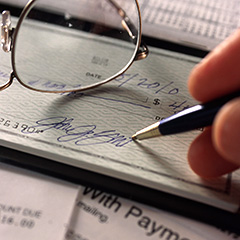Successful Bill Collecting Begins with Information
September 19, 2014 | Accounting Standards, Business Plans, Financial Planning
 As a small business owner, you are always going to have customers who don’t pay their bills on time. Due to unique relationships with customers as well as the varied responses they have to collection efforts, trying to collect the money owed to your business can be a difficult situation. Customizing guidelines for each account can be a way to improve results. By developing these guidelines, you are able to maintain relationships with your customers while still following through with collection efforts.
As a small business owner, you are always going to have customers who don’t pay their bills on time. Due to unique relationships with customers as well as the varied responses they have to collection efforts, trying to collect the money owed to your business can be a difficult situation. Customizing guidelines for each account can be a way to improve results. By developing these guidelines, you are able to maintain relationships with your customers while still following through with collection efforts.
It is important to make sure that each customer file contains the following:
- Your business’ relationship with the customer, its importance and its history.
- Customer contacts. All the names, addresses, e-mails and telephone numbers for customers should be updated regularly. One major reason why bills go unpaid is because they are sent to the wrong address.
- The customer’s complete sales history.
- A history of payments, both on time and late. Any discounts the customer has received should be noted. Add information about previous collection efforts, including what worked and what didn’t.
- Projected sales and collection cycles for the customer’s business. Include any data and forecasts for the industry.
For more information about how to boost collection efforts for your Maine-based small business, contact Filler & Associates.
